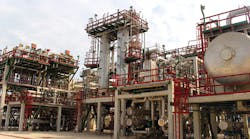Eric Watkins
Senior Correspondent
LOS ANGELES, Feb 24 -- The Russian government plans to begin construction of its 4,118 km Taishet-Perevoznaya pipeline in June-August of this year, with oil exports expected to begin in August-September 2006.
The announcement was made on Feb. 22 by Viktor Gorchakov, deputy governor of the Primorsky Krai—the Russian Maritime Region—where the development will take place.
The pipeline, with 44 pumping stations, will extend from Taishet in Siberia's Irkutsk region to Perevoznaya Bay of the Sea of Japan.
"Design work has been going on since January 2005," Gorchakov said. He added that pipeline construction is planned to begin this summer at two locations simultaneously—Taishet and Perevoznaya Bay.
His remarks came after a meeting in Vladivostok between regional leaders and the head of the federal sea and river transport agency Vyacheslav Ruksha.
Gorchakov said oil would be transported to the Perevoznaya terminal by rail until the pipeline is completed. Regional authorities currently are upgrading the railway links to Perevoznaya, especially the 90 km section from Baranovskaya to Kedrovaya.
Gorchakov's remarks followed a Feb. 21 meeting in Moscow between Japanese and Russian experts to discuss the pipeline project. They reportedly discussed exploration for oil in eastern Siberia and Japanese financial aid for the project as well as the economic and environmental effects of building the pipeline.
Participants at the meeting included representatives of Japan's Natural Resources and Energy Agency, Japan Bank for International Cooperation, Russia's Industry and Energy Ministry, and state-owned pipeline operator OAO AK Transneft.
Japanese ports are just 400 km from the proposed terminus of the pipeline, but Russia also hopes to export its oil to China, South Korea, Indonesia, and Australia.
In early February, South Korea indicated its interest in the proposed pipeline and suggested forming a group with the Russian government that would enable South Korean firms to join the project.
State oil company Korea National Oil Corp. (KNOC) made the proposal at an economic forum held by the two countries in Moscow. KNOC reportedly showed a willingness to help Russia form the group, which would include finance, construction, steel, and petrochemical companies.
During the forum, Vladimir Milov, head of Russia's nonprofit Institute of Energy Policy, said the project cost estimate is $11-14.5 billion.
At the time, Itar-Tass news agency reported that pipeline design and construction proposals were expected by March 15 along with the sources and mechanisms of partial financing from the Russian federal budget.
Russia's Ministry of Industry and Energy also expects by that date to hear ideas for speeding project implementation and tax and customs incentives.
